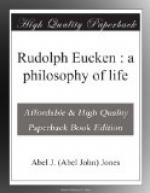But the spiritual beginnings within us often show remarkable vitality. They may under certain conditions lead us to appreciate the existence of a distinct opposition in the world—the opposition between the lower world and the higher self. Man finds that the natural is often low, evil, and sordid, and at this stage the higher spiritual world makes a strong appeal to him. By degrees he comes to feel the demands of the lower world to be a personal insult to him. What is the lower material world that it should govern him, and he a man? The claims of pleasure and utility to be standards of conduct strike him as arrogant, and he revolts against the assumption that higher aims can have no charm for him. His previous acceptance without consideration of the moral standard of the community he now looks upon as a sign of weakness on his part—for is he not himself, a person with the power of independent judgment and evaluation? It is the first great awakening of the spiritual life in man, when his whole soul is in revolt against the low, sordid, and conventional. What shall he do? There is only one course that is worthy of his asserting personality—he must break with the world. Henceforth he sees two worlds in opposition—the world of the flesh on the one hand, the world of the spirit on the other, and he arrays himself on the side of the higher in opposition to the lower. When he does this the spiritual life in him makes the first substantial movement in its onward progress—this movement Eucken calls the negative movement. It does not mean that the man must leave the world of work and retire into the seclusion of a monastery—that means shirking the fight, and is a policy of cowardice. Neither does it mean a wild impatience with the present condition of the world—it means rather that man is appreciating in a profound way the oppositions that exist, and is casting his lot on the side of right. He renounces everything that hinders him from fighting successfully, then goes forth into the thick of the battle. The break must be a definite one and made in a determined manner. “Without earnestness of renunciation the new life sinks back to the old ... and loses its power to stimulate to new endeavour. As human beings are, this negation must always be a sharp one.”




